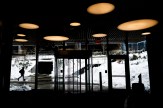Building the future of K-12, here at Northeastern

Sixth-graders at Barrington Middle School in Rhode Island imagined a room in what will become the new Barrington Middle School, currently under construction. They thought about what they’d need in this new flexible space, drew up plans, and in the process, learned a whole lot about rates, ratios, spatial reasoning, and more.
It’s this type of real-world learning that school leaders in Barrington want to expand throughout the district. And they’re turning to Northeastern for help.
Paula Dillon is the assistant superintendent of Barrington Public Schools. She’s also a graduate of Northeastern’s education doctoral program. A few years ago, she started noticing her students, who outperformed a wide percentage of schools in standardized tests, weren’t able to connect what they were learning in school and how they could use it outside the classroom.
“They saw learning as more of an entry ticket to college, and not as much beyond that,” said Dillon. “That was a wake-up call.”
So, Dillon and other Barrington educators began a shift toward experiential learning, wherein students have an opportunity to physically do something with the material they’ve learned. Dillon and Barrington Middle School Principal Andrew Anderson worked with other educators at a Global Learning Network conference, they won a grant from Rhode Island Gov. Gina Rimondo’s Office of Innovation, and they’ve partnered with Northeastern, a global leader in experiential education.
Dillon and Anderson are among the hundreds of educators who will convene on Northeastern’s Boston campus over the next four days to explore how to continue growing experiential learning in elementary-, middle-, and high schools around the world.
They attended the university’s inaugural Network of Experiential Learning Teachers (NExT) conference in 2017, where they first created their plan for integrating experiential learning into their curriculum.
As they implemented their plan throughout the year, they found the network of K-12 teachers implementing their own experiential learning models in districts across North America to be crucial touchstones, Dillon said.
“The expertise of people at Northeastern, the expertise of people in districts across the country and in Canada—that’s been extremely helpful to us,” she said.
Anderson said last year’s conference also afforded them an opportunity to connect with like-minded people who were excited about changing K-12 education.
“There was just a ton of energy in the room,” he said. “We were really inspired by the Northeastern students available as well. Seeing how the pillars of Northeastern are ingrained in every part of life at Northeastern made us start thinking about the Barrington Public School student, and what we want for them.”
In the meantime, Barrington middle schoolers will continue pitching entrepreneurial ideas that solve big problems, Shark Tank-style; and measuring the time between when a ball hits a bat at Fenway Park and the moment the crowd reacts, in order to make recommendations for how to keep ballparks safe.





